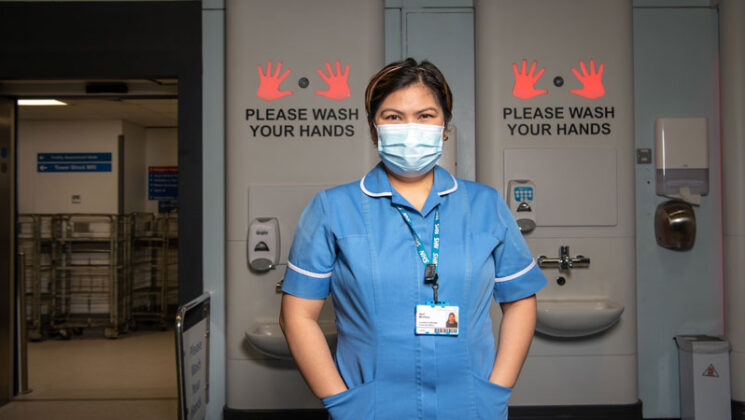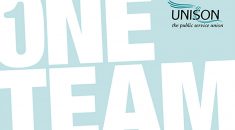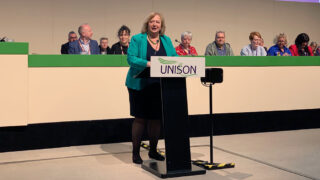She’s only been living and working in the UK for two years, but that’s all it took for April Montoya (pictured above) to win the overseas nurse of the year award at the Nursing Times Workforce Awards.
April is currently working as an A&E nurse in Hull Royal Infirmary, seconded in the now routine effort to combat COVID-19. But she plays a much wider role in the life of the Hull University Teaching Hospitals NHS Trust, in support of fellow overseas nurses.
As co-deputy chair of the trust’s BAME network group, April has helped her employer improve its induction and education processes for internationally recruited nurses – most of whom are Filipino. The awards judges noted “the positive impact” she’s made on both overseas nurses and the trust itself, in the relatively short time she’s been in the UK.
“I was over the moon,” April says of winning the award, which she collected at an event in London last year. “Hearing my name was a proud, humble moment for me. Walking to the stage I felt like I was wearing my Filipino flag, because I know many Filipino nurses who are doing similar things – I’m representing all of them. And it gives me energy, enthusiasm, inspiration to do more.”
A growing community
April came to the UK in November 2019 – not from the Philippines, but via Saudi Arabia, where she’d worked for 10 years, and where she gave birth to her third child. She had always intended to come to the UK eventually, as do the thousands of Filipino nurses – some 39,000 are registered with the Nursing and Midwifery Council (NMC) – who grace the NHS with their skill and commitment.
“It’s well-known in the Philippines that the UK offers opportunities, not only for financial stability but for career development,” she says. “I’m very happy to be here. I really feel I have accomplished a dream.”
April estimates there are around 300 Filipino nurses in her trust’s two hospitals, with more arriving each month. And it’s this growing community, along with healthcare workers in care homes and private hospitals across the city, that she endeavours to welcome and support.
Filipinos are famously family-centric, so leaving loved ones behind can be tough and homesickness is a big factor when they first arrive. The language barrier adds extra stress; while they can speak English, and must pass an English exam for the NMC, accents, pronunciation and foreign workplace terminologies all need to be worked on.
Much of April’s support comes through her work as an ambassador for the Philippine Nurses Association UK (PNAUK), the older of two associations helping their members adjust to and prosper in this country.
She was recently involved in an online forum of Hull nursing leaders, coordinated by the association and with its chair Oliver Soriano taking part, to identify the support needed by Filipino nurses across the city’s workplaces. As a result, a new PNAUK Hull chapter will offer pastoral care and disseminate information on things such as career and professional development, as well as celebrations like International Nurses Day and Black History Month.
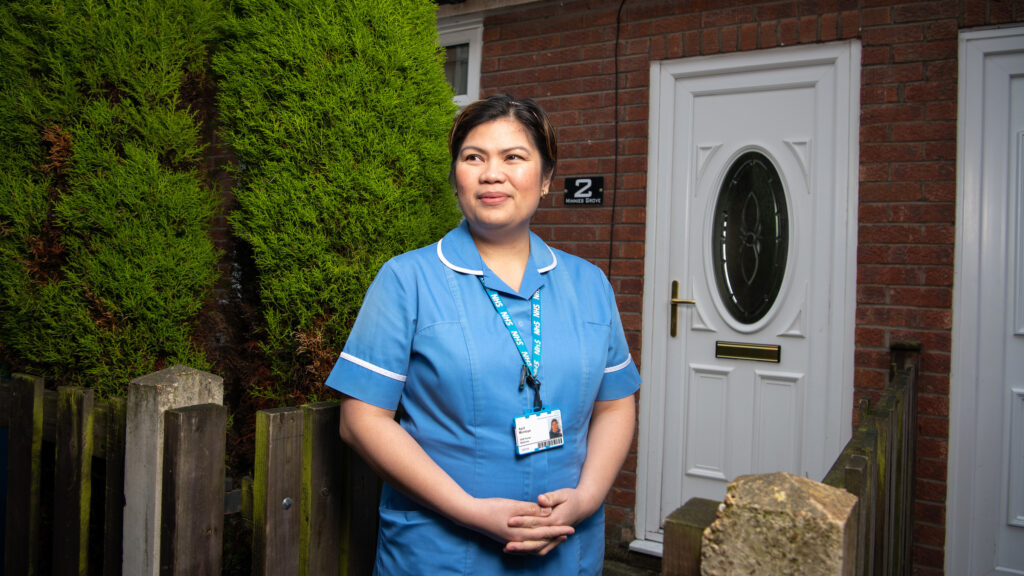
April’s aim is “to give a sense of a family for anyone here in Hull.” That extends to the mother of three opening her own home for informal welcome parties, lockdown restrictions permitting.
“We prepare food for them – Filipino food,obviously, because they are missing home. I invite other nurse leaders and community leaders to come over as well. We talk about what living in Hull is like, places to visit. And I usually invite the last group, too, so they can share their experiences of the OSCE examination [the practical exam for overseas staff wishing to register with the NMC].
“My personal opinion is that the first three months is a very critical period. That’s the reason why we target them at this moment, so that everyone feels a sense of home.”
She laughs when she adds: “We are literally looking for a larger house, because my husband says that ours is like a municipal hall for newcomers.”
Her own professional life is thriving – if inevitably side-lined by COVID. Last October April was made compliance manager of the trust’s quality governance and assurance offices. Once A&E can let her go, she will head a team responsible for ensuring that the hospital complies with standards, guidelines and regulations aimed at ensuring patient safety.
Soon, UK-born health staff will also be benefitting from April’s dedicated and enthusiastic support, as she’s just completed the first part of her UNISON steward’s training. “I always tell people, ‘I’m not here to take you out from the dark, but I will walk you through it,’ she says. “It’s about empowering them.”
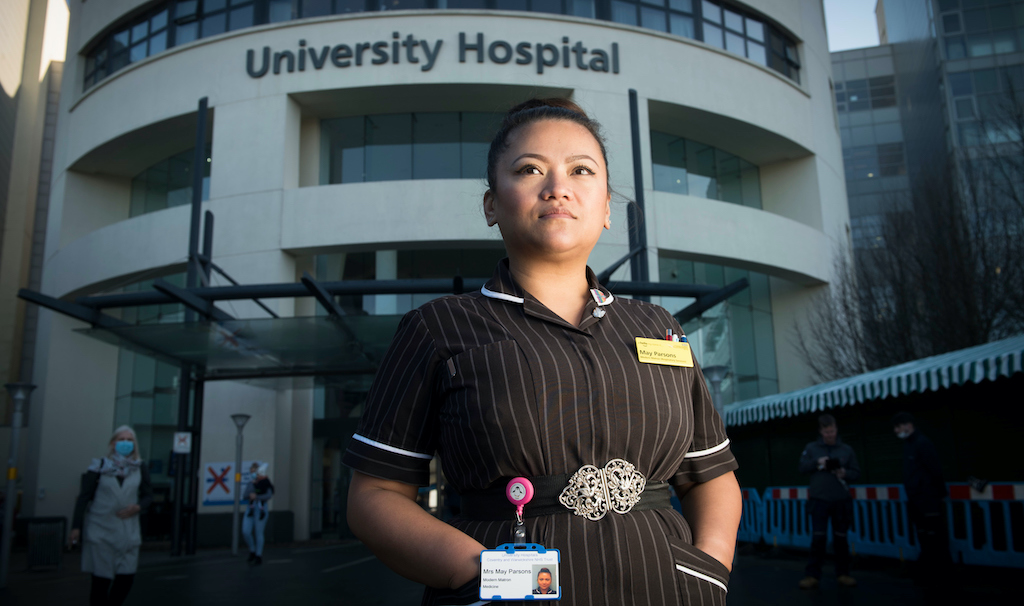
THERE haven’t been many national stories during the pandemic that have caught the public imagination for positive reasons, rather than tragic. But one such moment came in December 2020, when NHS matron and UNISON member May Parsons (pictured above) administered the world’s first COVID vaccination, to 90-year-old grandmother Maggie Keenan, in Coventry. Suddenly, for everyone, there was hope.
Thinking back to that “momentous” day, May is in no doubt of the positive effect of the vaccination programme.
“We had already witnessed a lot of deaths in our trust. And working in intensive care and the COVID wards, knowing the extent of the virus, it was just mind-blowing to be able to offer the vaccine to everyone. It struck me that the world was changing.”
May has been living in the UK and working for the NHS since 2003. She was the matron for education and escalation, at the University Hospitals Coventry and Warwickshire NHS Trust, when COVID first hit. As her hospital quickly redirected its resources towards tackling the virus, May volunteered to work in the intensive care unit, where she could put her training to good use.
“We were all terrified, but I would rather know that I could be of some help,” she remembers. “It was something that needed to be done.”
Making history
She was chosen to administer that first Pfizer/BioNTech jab partly because of her passionate advocacy of peer flu vaccinations. She was also part of the group in her trust planning for the rollout of the COVID vaccine.
The spotlight that followed had several unexpected consequences. The fact that Maggie wore the trust’s charity t-shirt on the day (courtesy of May, pictured below with her patient) led to sales soaring 500% – the proceeds went toward buying equipment that benefitted both patients and staff – and the pair of them won a charity award.
Maggie and May were also interviewed online by NHS England chief executive Sir Simon Stevens, and May was asked to speak at both a Nursing Times Awards ceremony (where she
received a standing ovation from her fellow nurses) and the service marking the 73rd birthday of the NHS, at St Paul’s Cathedral.
What has meant to most to her, she says, has been the chance to highlight the “invaluable role that nurses played in the pandemic”, along with the whole NHS team.
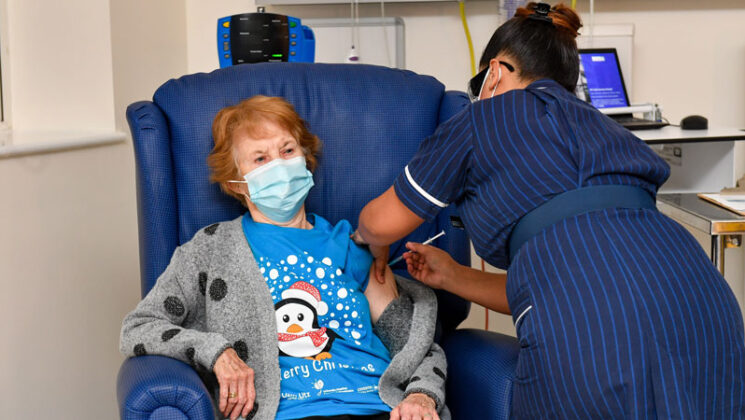
© Jacob King/PA Wire/PA Images
May has since resumed her duties as matron for respiratory medicine – the COVID wards, along with TB, infectious diseases, lung cancer and more, where she’s overseeing more than 220 staff.
As if that, and being a mother of two teenage children wasn’t enough, last year May joined the newly formed Filipino Nurses Association UK (FNA-UK), quickly becoming its regional director for the West Midlands.
While still a new organisation, the FNA-UK’s work already includes OSCE training, leadership and interview skills workshops, pastoral care, health and well being training, immigration
guidance and meet and greets. It also seeks to encourage equal opportunities for its members, particularly those seeking leadership positions.
Last September, May organised a ‘thank you’ event for Filipino nurses and their partners in her trust, which has around 260 Filipinos on staff, “just to say that we acknowledge the part that they’ve played in the pandemic”.
Sacrifices
It’s worth remembering that while Filipino health staff help keep the NHS keep afloat, they have been unable to see their own families back in the Philippines – a fact that was compounded horribly when the super typhoon struck the islands in December.
“There were nurses and healthcare workers here whose families were directly affected,” says May. “They couldn’t talk to them for four or five days, they didn’t know where they were. How are you meant to go to work not knowing if your parents or your children are safe?”
This was another instance in which the FNAUK could try to help, raising money for food and relief goods, and signposting members to people in the Philippines who might be able to locate their families.
May is particularly proud of the role the association played recently in having Filipino ethnicity recognised in the NHS electronic staff record and with the NMC: for the first time, ‘Filipino’ is an option when registering, rather than ‘other’.
“It just makes you feel that for all these years that the NHS has recruited Filipino nurses – after all we’ve given to the NHS and to the healthcare system in the UK – they haven’t really seen us. When you think about it, that hurts a lot.
“So this actually says ‘Filipinos are here’. It makes you feel a bit more seen, a bit more heard, a bit more recognised.”
Philippine Nurses Association UK
Filipino Nurses Association UK
UNISON has many overseas nurses in its ranks, both as members and union reps. A network of overseas nurses is being created for them to support each other and offer their expert opinion to the UNISON health team. Anyone who’s interested in joining the network can contact us by emailing:
h.group@unison.co.uk

